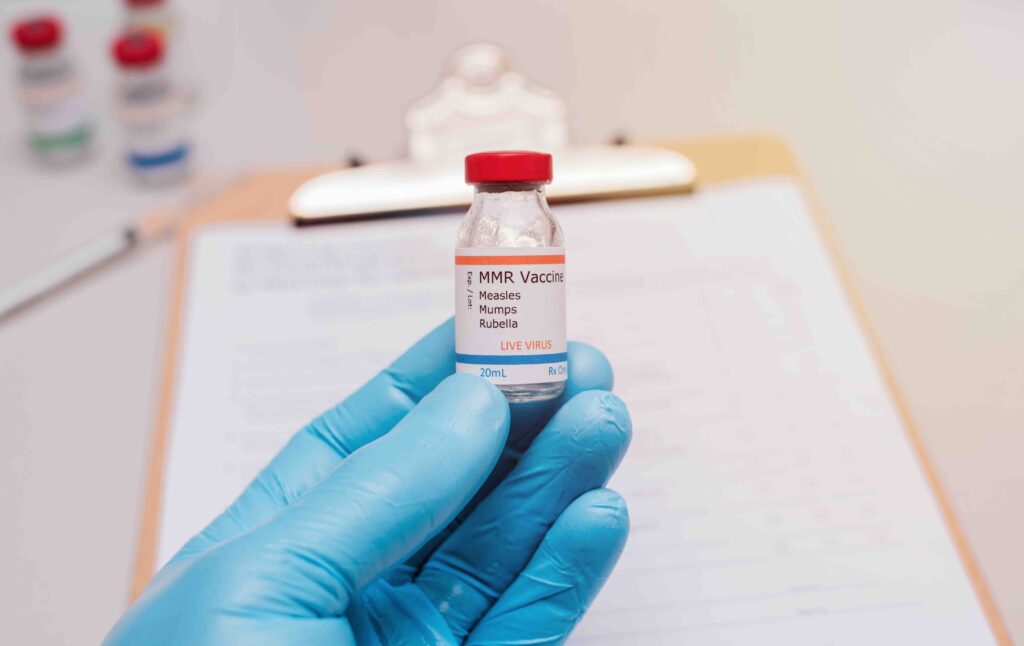Measles, Mumps and Rubella: MMR Vaccination in Streatham and Norbury
When you get the measles, mumps and rubella (MMR) vaccine, you’re protecting yourself against three serious diseases. It’s free for all children aged two years old and over who are not up to date with their vaccinations.
The MMR vaccine protects against
- Measles – a contagious viral infection that can lead to serious complications such as meningitis and pneumonia. It usually starts with cold-like symptoms, followed by a rash that spreads all over the body. Measles can be fatal in some cases.
- Mumps – an infection of the salivary glands which causes swollen glands in your cheeks, neck and jaw area. It may also cause painful swelling of your testicles in boys or ovaries in girls under 16 years old, along with fever, headache and loss of appetite.
- Rubella (German measles) – this virus causes mild fever, rash and swelling of lymph nodes during childhood, but it tends to be more dangerous if contracted later in life as it can cause birth defects including deafness or heart problems
Westbury Chemist offers MMR vaccinations to prevent infections from the diseases. Our travel clinic appointments are from 10:00 am – 17:00 pm Monday to Saturday
Book MMR Vaccine Online
What is MMR?
The MMR vaccine is a single injection that protects against three separate illnesses: measles, mumps and rubella – also known as German measles. Each of these illnesses is potentially serious and can have long-term consequences.
Measles, mumps and rubella vaccination is given as part of the routine NHS childhood vaccination programme to babies at around one year old, followed by a pre-school booster dose. Adults who missed out on the MMR vaccine in childhood can be vaccinated anytime if they are not already immune.
The two-dose course of MMR vaccine protects more than 95% of children and 99% of adults against measles, more than 99% against mumps, and 100% against rubella. The World Health Organization (WHO) recommends that all countries offer two doses of MMR vaccine as part of their national immunisation programmes – with the first dose given at 12–15 months old and the second between ages four and six.

Symptoms of measles
The best way to prevent measles is by having the MMR vaccination. The injection spreads very easily and can cause serious health implications. Measles can spread through the air when an infected person coughs or sneezes.
Initially, measles starts with symptoms that are similar to having a cold. After a few days, a rash forms and small spots in the mouth.
Cold-like Symptoms
- Watery and sore eyes
- Sneezing
- Coughing
- Runny nose
- High-temperature
Spotty Mouth
Sometimes, a few days after the cold-like symptoms, white spots can form on the side of the cheek and behind the lips. These spots pass after a few days.
Rash
In addition to spotty mouth, a few days after the symptoms, a non-irritating rash forms. Usually, it starts on the head and eventually develops across the body. This clears after a few days.
Symptoms of Mumps
After becoming infected with the mumps virus, the symptoms usually develop between 12 and 25 days later (this time period is known as the incubation period). About 17 days are required for incubation.
Most people with mumps experience swelling of their parotid glands. The parotid glands produce salivation. Just below your ears are two of them on either side of your face.
The swelling usually affects both glands, though sometimes only one gland is affected. In addition to pain and tenderness, swelling can make swallowing difficult.
General mumps symptoms
- Joint pain
- Headache
- Feeling Sick
- Dry Mouth
- Mild abdominal pain
- Feeling tired
- Loss of appetite
- A high-temperature
Symptoms of Rubella
- Spotty Rash starts on the face or behind the ears and eventually spreads around the body
- Coughs
- Aching fingers, wrists and knees
- Headache
- Sore throat
- Sore red eyes
Measles, Mumps and Rubella (MMR) vaccination
The MMR vaccine is a combined vaccine that protects against measles, mumps and rubella. It is given to children in two doses: one dose at 15 months of age (12-15 months), followed by a second dose at 3 years of age (15 months). The first dose is not as effective as the second dose but will still help protect your child from these diseases.
How does the MMR vaccine work?
The MMR vaccine contains a mixture of live attenuated viruses. This means they have been weakened so that they cannot cause measles, mumps or rubella in people who are vaccinated. The viruses are inactivated individually and then put together in the vaccine before being injected into your muscle.
When you receive the MMR vaccine, your immune system recognises the viruses as invaders and produces antibodies to fight them off. If you were to come into contact with one of these diseases later in life, your immune system would recognise it as an invader and produce more antibodies to fight it off quicker than if you had not been vaccinated (so-called “herd immunity”).
What are the common side effects of the MMR vaccine?
Side effects are generally mild and temporary. The most common side effects of the MMR vaccine include
- Fever (3–5% of people)
- Redness, swelling or pain at the injection site (7–10%)
- Diarrhoea (1–2%)
Other possible side effects include:
- Vomiting (1-2%)
- Loss of appetite (1-2%)
- Headache/tiredness/drowsiness (1-2%)
Consult your GP or practice nurse if any side effects persist.
Fear over links with Autism
The MMR vaccine has been associated with autism spectrum disorders.
This has led a number of people to question whether their children should receive the combined MMR vaccine, despite the fact that there is no concrete evidence linking MMR to autism or ASD.
What’s more, the majority of parents who refuse to vaccinate their children are instead opting for single vaccines against measles, mumps and rubella – which do not offer full protection against these diseases.
Live vaccines and immunosuppression
Live vaccines are not recommended for people with a weakened immune system. This includes:
- People who have had an organ transplant, or are about to receive one
- People who are receiving chemotherapy treatment for cancer
- People with HIV/AIDS
If you fall into one of these categories, your doctor will likely advise against getting a live vaccine. However, if the risk of infection is high enough and the benefits outweigh the risk for you personally, your physician may decide to give you a live vaccine in a hospital or clinic setting. That way, medical professionals are nearby in case of emergency. Some examples of live vaccines include MMR (measles mumps rubella), rotavirus and influenza (flu).
A single MMR shot is 95% effective at preventing measles for 15 years, 99% effective at preventing mumps for 25 years and 100% effective at preventing rubella forever
If you’re a parent, it’s important to know that the MMR vaccine is more effective when given as a single shot. The measles, mumps and rubella vaccine (MMR) is given as one dose of vaccine to children at 12-15 months of age. Studies show that this single dose is 95% effective at preventing measles for 15 years, 99% effective at preventing mumps for 25 years and 100% effective at preventing rubella forever.
More on MMR
You may have heard some of the myths about MMR vaccination and be concerned about having your child vaccinated. However, there is no scientific evidence to support these claims. The UK is one of the countries that has seen a decline in immunisation rates, leading to outbreaks of potentially fatal diseases. By vaccinating your child against measles, mumps and rubella, you are protecting them from these infectious diseases that can cause serious complications such as pneumonia, deafness or brain damage. You will also be protecting other children who cannot receive the vaccine for medical reasons by helping maintain good levels of immunity in the community.
Visiting Westbury Chemist for your MMR Vaccine in Streatham
Westbury Chemist Streatham is now providing MMR Jabs. We do not accept walk-in appointments. Please book your appointments online.


